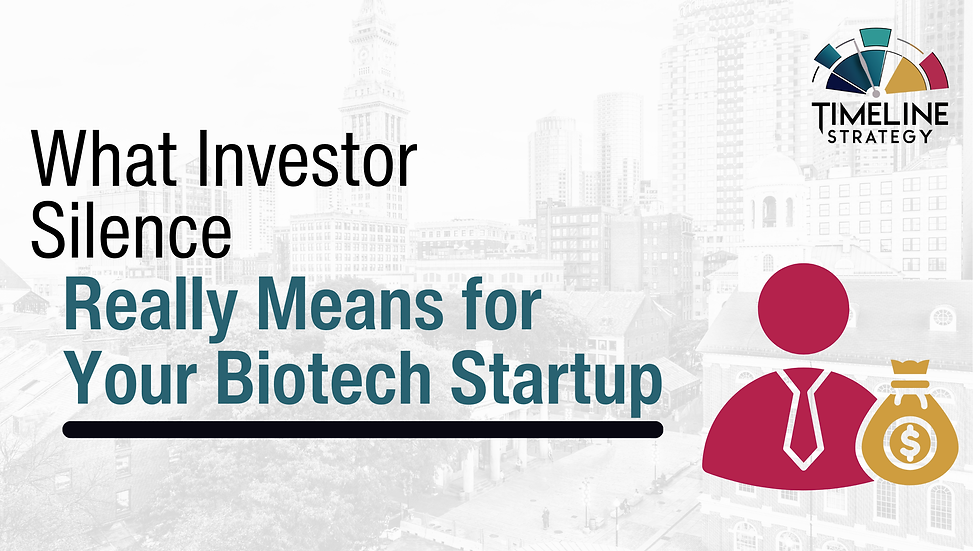Biotech Is Not a Research Project: Start Building a Company, Not Just Science
- Attila Foris

- Oct 12, 2025
- 4 min read
When you're spinning out of academia or launching your first science-driven startup, it's easy to default to what you know: experiments, validation, technical depth.
👉 But here's the reality biotech founders often overlook:
👉 If you're still running your company like a research project, you're not actually building a biotech company.
This isn't a criticism of your science. It's a call to elevate it. Because what works in a lab doesn't automatically work in a business. And until you make that shift, you'll keep hitting invisible walls with investors, with your team, with your timelines.
✅ This article is about recognizing that gap, and more importantly, knowing how to close it.

From Hypotheses to Milestones: Think Like a Biotech Company
In academic research, exploration is the goal. You follow the data, pursue the unknown, and publish what you discover. That mindset drives innovation. But it does not drive companies forward.
👉 A biotech company must operate on milestones. Not open-ended hypotheses.
Milestones are how you earn the next check. The next partnership. The next round of credibility. And they need to be more than technical goals.
👉 They must signal commercial progress. Risk reduced. Value created. Momentum built.
If your strategic plan is still organized around “next experiments,” you are signaling that you do not yet know what business you are building.
Here is how you know you have made the shift:
1️⃣ Your roadmap aligns with funding and decision points. Not just publication-ready data.
2️⃣ You can define your next three milestones in business terms. Not a scientific detail.
3️⃣ Your team knows what progress looks like, even those without a PhD.
If those are not true yet, that is your work. Because until you frame your science around strategic inflection points, you are not building a biotech company. You're doing great research with a logo.
From Publications to Proof Points
Academic training teaches you to communicate with precision and restraint. You are rewarded for complexity, caveats, and cautious optimism.
✅ But in a biotech company, clarity wins.
You do not need to oversimplify your science. However, you do need to make it legible to those who are not scientists, especially those who write checks.
👉 Investors do not fund publications. They fund proof points.
That means reframing your results as strategic signals. Not “we’re investigating a pathway,” but “we’re validating a mechanism to open a clinical path.” Not “significant findings,” but “evidence that de-risks the next round.” Not “we aim to publish,” but “we’re preparing for partnering discussions.”
👉 You are not diluting your science. You are translating it. And that shift is what builds confidence in your biotech company.

From Lab Culture to Leadership
Many scientific founders unconsciously recreate their academic environment inside their startup. They hire familiar profiles. They focus on technical depth. They avoid the uncomfortable parts of running a company.
👉 But a biotech company is not a lab with a logo. It is a business that needs direction, decisions, and delivery.
You do not just need great science. You need people who can translate it, execute it, and connect it to the outside world. That includes project managers who can keep momentum, advisors who ask hard questions, and operators who think in milestones, not methods.
✅ As a founder, your job is no longer to manage experiments. Your job is to build a company that can turn science into value.
That means learning to lead beyond your discipline, and surrounding yourself with people who complement, not replicate, your strengths.
What to Do Next
If you recognize yourself in any of this, that is not a failure. It is a signal that you are ready to shift from science mode to company mode. And that shift does not require a full reinvention; it needs clarity.
Here is where to start:
✅ Audit your current strategy:
Is it written down? Is it actionable? Does your team understand it without needing a whiteboard?
✅ Reframe how you talk about your work:
Can you explain your science in terms of value, not just validation?
✅ Set business milestones:
Define what progress means beyond experiments. Investors fund movement, not motion.
✅ Bring in strategic support:
Book a Timeline Strategy workshop and get out of the research loop.
👉 You are not here to run another project. 👉 You are here to build a biotech company that moves.
Conclusion - From Research to Real Impact
You did not start your biotech journey to stay in research mode forever. You started it to make something real. To solve a problem that matters. To build something the world needs.
👉 Turning science into a company is not a betrayal of your research. It is the evolution of your vision.
If you feel stuck between the lab and the market, you are not alone. But staying stuck is optional.
✅ You already have the science. Now build the company.
Ready to Break Your Bottlenecks?
AI won’t replace your leadership — but it will change the game you’re playing.
The companies pulling ahead aren’t just collecting more data; they’re making sharper, faster decisions because they understand how to turn that intelligence into strategic action.
👉 That’s where Attila steps in. In a focused 1:1 strategy session, you’ll work together to cut through noise, reframe your competitive landscape, and build a plan that positions your biotech to lead — no matter how fast the market moves.
This isn’t about chasing the latest tool. It’s about making the right strategic calls before your rivals do.





Comments